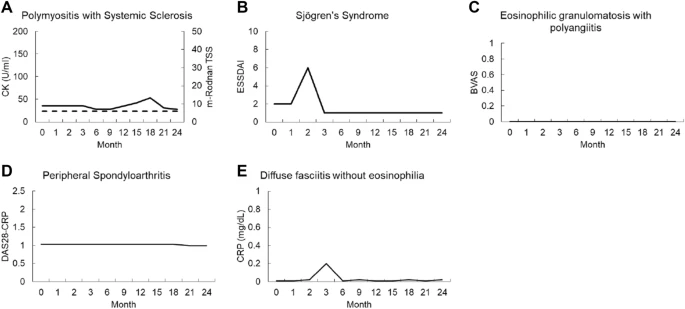Abstract
Background
Allergen immunotherapy (AIT) is the only treatment that has modified the natural history of allergic diseases. However, since its overall effect on the immune system has not been elucidated, AIT is either absolutely or relatively contraindicated in patients with rheumatic autoimmune diseases (RADs). Therefore, there have been no long-term observations of patients with RADs receiving AIT; thus, the effectiveness and safety of AIT in these patients remain unclear.
Methods
This was a single-center retrospective observational study. RAD patients receiving AIT for allergic rhinitis at our institution were selected. Changes in the activity of RAD patients were investigated for 2 years from baseline, including those who discontinued AIT. The effectiveness of AIT was also investigated using the Japan Allergic Rhinitis Standard Quality of Life Questionnaire.
Results
Thirteen patients with RADs were enrolled in the study. All patients received sublingual immunotherapy, of which four discontinued AIT owing to adverse events. Among all patients, the symptoms of RADs in three patients worsened during the observation period; however, none of them were causally related to AIT. Most of the adverse events associated with AIT were mild, in which only one patient required drug intervention due to worsening rhinitis symptoms. In the nine patients who were able to continue AIT, their eye and nasal symptom scores showed a significant improvement from 1.67 (1.5–2.0) at baseline to 0.67 (0–1.17) in the 2nd year of treatment (p = 0.0141).Conclusions
AIT is a safe and effective treatment modality for patients with allergic rhinitis complicated by RADs.


No comments:
Post a Comment